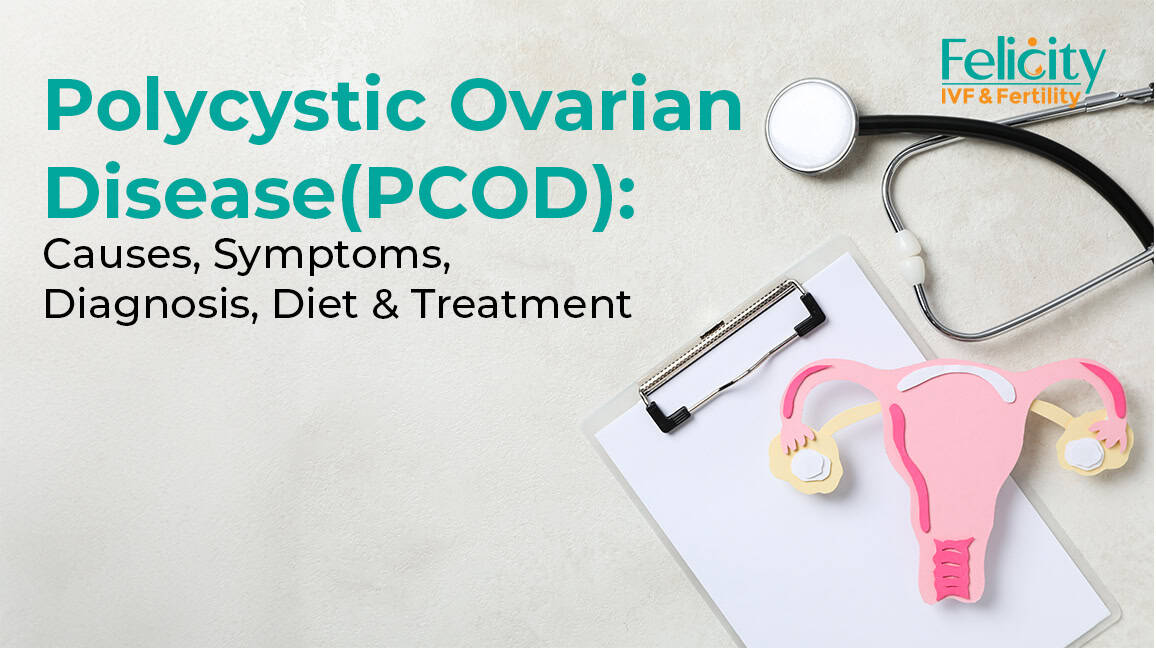Polycystic Ovarian Disease(PCOD): Causes, Symptoms, Diagnosis, Diet & Treatment

Many women all over the world experience Polycystic Ovarian Disease (PCOD). The process causes hormones to be out of balance, which results in cysts in the ovaries. Even though PCOD can occur at any time, it happens most often in reproductive women. A person can experience disrupted periods, extra hair growth and problems with fertility because of Polycystic Ovarian Disease (PCOD).
What Triggers or Brings on PCOD?
Doctors are still looking for answers to what the PCOD problem causes are, even though several things may play a role in its formation. Most of the time, hormone imbalances happen as a result of both genetic and environmental factors. Here are a few things that commonly lead to noise-pollution issues:
- Genetics: If a woman’s mother or sister has PCOD, she has a greater possibility of developing this condition.
- Insulin Resistance: High levels of insulin in insulin resistance can also cause a rise in androgen hormones, which can lead to extra facial and body hair and acne in women with PCOD.
- Androgen Levels: In cases of PCOD, there is often an increase in androgen hormones, which can disrupt the normal way that an egg is released.
- Inflammation: Higher levels of inflammation in the body may result in excess androgen production and affect a woman’s period.
These issues can lead to PCOD problem in females, which makes it a challenging condition to handle.
What Are the Symptoms of PCOD?
Everyone may have different PCOD problem symptoms, though some of the most common signs are the following:
- Irregular Periods: One of the main signs of PCOD is that menstrual cycles sometimes occur irregularly, which might make periods disappear or stay longer than usual.
- Excessive Hair Growth: Androgens, when they are too high, result in hirsutism, a situation where both facial and body hair increase.
- Acne and Oily Skin: An increased level of androgens can result in acne and different skin concerns.
- Weight Gain: Weight problems are common in women with PCOD, mainly affecting the belly.
- Thinning Hair or Male Pattern Baldness: Another indication of increased androgens in the body is thinning hair or male pattern baldness.
- Difficulty Conceiving: Infertility or trouble getting pregnant is often caused by PCOD because it negatively affects ovulation.
How Do Doctors Diagnose PCOD?
PCOD is diagnosed by checking the patient clinically, testing their blood and using imaging. Generally, the diagnosis process consists of the following:
- Medical History and Symptoms: The doctor will discuss with the patient about their periods, any recent changes in weight and issues like more hair growth or acne.
- Physical Examination: During the physical exam, signs like extra body hair or acne may be recognised.
- Blood Tests: Blood tests are done to check the levels of hormones, including androgens, which may be out of balance and causing the symptoms.
- Ultrasound: An ultrasound scan may be used to detect cysts in the ovaries that are usually found in PCOD.
What Role Does Diet Play in Helping PCOD?
Taking care of Polycystic Ovarian Disease (PCOD) requires a healthy diet that helps control hormone levels, keeps weight in check and boosts insulin sensitivity. If the diet plan for PCOD is good, it can make many of the symptoms less serious and boost the quality of life. The following tips may help you manage PCOD:
- Low Glycaemic Index Foods: Pay attention to foods that are low on the glycaemic index, for example, whole grain foods, beans and vegetables.
- Lean Proteins: Blend chicken, turkey, tofu and fish into your diet to help your muscles and watch what you eat.
- Healthy Fats: Avocados, nuts and olive oil are examples of healthy fats that might help cut down on inflammation.
- High-Fibre Diet: A diet rich in fibre can assist with weight management and normal blood sugar levels, which increases insulin sensitivity.
- Limit Processed Foods: Try to avoid refined carbs, sugar in snacks and processed foods since they may worsen your insulin resistance and cause inflammation.
If you eat the foods above as part of your diet plan for PCOD, it may help you reduce unexplained weight gain and keep your periods regular.
What Is the Treatment Favoured for PCOD?
Although Polycystic Ovarian Disease (PCOD) cannot be cured, several options exist to ease its effects and raise your general well-being. Whether and how to treat endometriosis is largely influenced by its severity and the patient’s wish to have children. The most usual treatments for PCOD are mentioned here:
- Medications for Irregular Periods: Some treatments used for irregular periods are birth control pills, progesterone, or other hormonal therapies to help menstrual cycles become more regular and control androgens.
- Insulin Sensitisers: Metformin is an example of an insulin sensitiser that improves insulin sensitivity in those who have PCOD and insulin resistance.
- Fertility Treatments: If a woman has infertility, medical professionals might recommend Clomid or ovulation induction to help control her ovulation and raise her chances of getting pregnant.
- Hair Removal Treatments: Dealing with extra hair on the body: It may be suggested to try laser hair removal or electrolysis.
- Lifestyle Changes: You should regularly exercise, find ways to handle stress and have a well-balanced diet if you want to manage PCOD.
In case of a PCOD problem after marriage, early medical guidance can increase the success of conceiving and effectively control the signs.
Felicity: Helping You with the Symptoms of PCOD
Managing Polycystic Ovarian Disease (PCOD) may be hard, although proper care and advice can make it possible for you to enjoy a good life. With the right medical plan, healthy habits and some food changes, PCOD can be managed.
Our treatment plans at Felicity IVF & Fertility Centre are made to suit the requirements of each person. Our experts are committed to caring for you and finding useful approaches to reach better health and fertility.
FAQs
The PCOD problem causes include genetic factors, insulin resistance, hormonal imbalances, and inflammation. These factors can disrupt ovulation, leading to difficulty conceiving and infertility, making it harder for women to get pregnant.
PCOD problem symptoms include irregular periods, excess hair growth, acne, and weight gain. Managing them involves a healthy diet plan for PCOD, medications for hormonal balance, and lifestyle changes to regulate insulin and improve overall health.
PCOD problem treatment can improve fertility through insulin sensitisers, fertility drugs like Clomid, and ovulation induction. Seeking treatment early, especially for a PCOD problem after marriage, can increase the chances of successful conception
